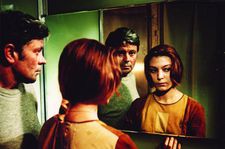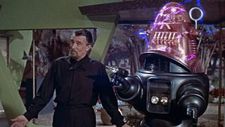It’s currently World Space Week, so we’re turning our Streaming Spotlight on classic tales which have been adapted into great films about space – some of them more than once. Together they speak to the dream of reaching out beyond this fragile planet to explore new frontiers and secure humanity’s future, but that doesn’t mean that they’re free of danger, or that humanity itself won’t be profoundly changed in the process. Action, adventure and a measure of hard science sit side by side with philosophy and musing on the human condition, and if you live in the UK, all of these films are available for you to stream right now.
 |
| Dune |
Dune - Sky Go, Now TV, Virgin TV Go
Few people have ever gazed as far into the future as Frank Herbert, nor taken on such a wide range of issues. Widely celebrated but also frequently misunderstood, Dune is the story of a young man thrust by circumstance and centuries of planning into a position of power which he recognises as destructive and dangerous, confronting him with a moral dilemma which he will ultimately flee. It’s a story about the dangers of charismatic leaders which also explores ecological issues, corporatism, religion and more as different factions vie for control of space travel – but if that sounds like hard going, don’t worry, there are also giant monsters. Denis Villeneuve is currently filming the second half of this adaptation. You can also find the David Lynch version on Netflix, watch the mini series on Amazon FreeVee or pop over to Rakuten TV to find out what Jodorowsky’s Dune might have been like.
 |
| Solaris |
Solaris - Filmbox, Amazon, Chili
Whilst British and American writers dominated science fiction in the West throughout the 20th Century, a separate tradition grew up in Eastern Europe, with different preoccupations. It led to a flurry of great films, only a handful of which made it onto the international marketplace. Andrei Tarkovsky’s Solaris, adapted from the book by Stanislaw Lem, was one of them. Following a psychiatrist who travels to a space station orbiting a recently discovered planet to find out what happened to its crew, it features one of the smartest conceptions of alien intelligence to date, and has still more to say about human beings. It’s a demanding film which will require all of your attention – if you want a lite version which is still a decent watch, check of Stephen Soderbergh’s take, which is currently streaming on Disney Plus and Virgin TV Go – but it’s very much worth the effort. It will stimulate your intellect, break your heart and linger in your dreams.
 |
| 2001 |
2001: A Space Odyssey - Virgin TV Go, Amazon, Apple TV
Arthur C Clarke was a writer concerned with the biggest themes in science fiction, but not always the most remote. He was interested in how we get from here to there. Closer to home than some of the other films discussed here, 2001, adapted by Stanley Kubrick from Clarke’s 1948 short story The Sentinel, is concerned with a group of astronauts researching the discovery of a mysterious black obelisk on the Moon. It explores ideas around guided evolution and the relationship between humans and computers (with Douglas Rain providing the voice of iconic supercomputer HAL 9000), and its stunning visual realisation of space in an era long before CGI made it the template for a generation of filmmakers, its influence still echoing today. The cool beauty of Kubrick’s style is perfectly suited to the romance of the void and to questions around the relationship between intellectual leaps taken in our distant past and the challenges which await us in the future.
 |
| The Martian |
The Martian - Disney Plus, Virgin TV Go
One of relatively few strong science fiction films adapted from a later work, Ridley Scott’s tale of a stranded astronaut surviving on a combination of potatoes and Abba began life as a book by Andy Weir, who, like Clarke before him, is interested in the transition between life on Earth and a possible future amongst the stars. Because it was published just over a decade ago, the science it depicts is still very close to our own, and it’s informed by an understanding of conditions on the Martian surface which simply wasn’t available to earlier writers. Matt Damon makes an amiable lead whom most viewers will feel for as he uses every scrap of material available to him to scratch a living, whilst back on Earth his colleagues put together a rescue plan which will take months to enact and may very well not work. In showing us all this, Weir and Scott make two clear points: that the environment on Mars is Mi>really tough, and that it can be conquered.
 |
| Aniara Photo: Courtesy of EIFF |
Aniara - BFI Player, Virgin TV Go, Arrow
In 1956, Harry Martinson, a winner of the Nobel Prize for Literature, wrote an epic poem on the theme of generation ships – those vessels which might one day be expected to carry humanity to other worlds whilst individual passengers die of old age en route, their descendants being the ones to eventually arrive. In this case the ship isn’t intended as such – it’s just going to Mars, but gets knocked off course by a minor impact and spirals off into the interstellar void. It’s a vessel designed to sustain its crew and passengers indefinitely, but with no work to occupy them and no hope of planetfall for thousands of years, what will become of them? Pella Kagerman and Hugo Lilja bring it to the screen in studiously prosaic form, presenting an environment we can all recognise, a spaceship which looks as if it was designed by IKEA, part hotel and part shopping mall, exquisitely at odds with the pressures of deep time and societal crisis. Martinson's poem has also inspired operas, and this is a small film with a big vision.
 |
| Forbidden Planet |
Forbidden Planet - Virgin TV Go, Amazon, Google Play
For the first known work of literature set in space we have to go all the way back to Lucien of Samosata in the mid 2nd Century. Between then and now, other works reflected on it even if they were not always directly about it. With its themes of isolation, colonisation and an encounter with new explorers, Shakespeare’s The Tempest provided perfect material for adapting into science fiction form in Fred Wilcox’s 1956 classic. Walter Pidgeon takes on the role of the magician, his intelligence enhanced by what he has found on a planet whose only other surviving occupant is his daughter (Ann Francis, a naive and frequently objectified yet strong willed take on Miranda). Leslie Nielsen, in pre-Airplane! days, is the captain who steals her heart after his ship lands there and needs to make repairs – but something is killing his crew. The Bard’s themes take on new life by way of Robby the Robot as a clunky Ariel and, in Caliban’s place, monsters from the id.
 |
| Ender's Game |
Ender’s Game – Netflix, Amazon Prime, Sky Go
One of the hallmarks of early 20th Century science fiction was its close relationship with colonialism. Worlds were there to be conquered, their native inhabitants to become, at best, trading partners, more often grateful subjects. Those who resisted were enemies to be swept aside. In the latter half of the century this gradually began to change, with authors growing more aware that aliens might have rights of their own. Orson Scott Card’s young adult novel Ender’s Game played an important role in this shift. Brought to the screen by Gavin Hood, it features Asa Butterfield as a boy recruited by the military because of his game playing abilities and trained as a strategic asset – taking quite some time to realise that it’s no longer a game he’s playing and that real creatures are being killed. Thematically similar to Starship Troopers, which was adapted from Robert Heinlein’s Farmer In The Sky and is currently streaming on Disney Plus and Virgin TV Go), it drops the straight-out satire in favour of a sensitive yet still adventurous take which will appeal to younger audiences.





















